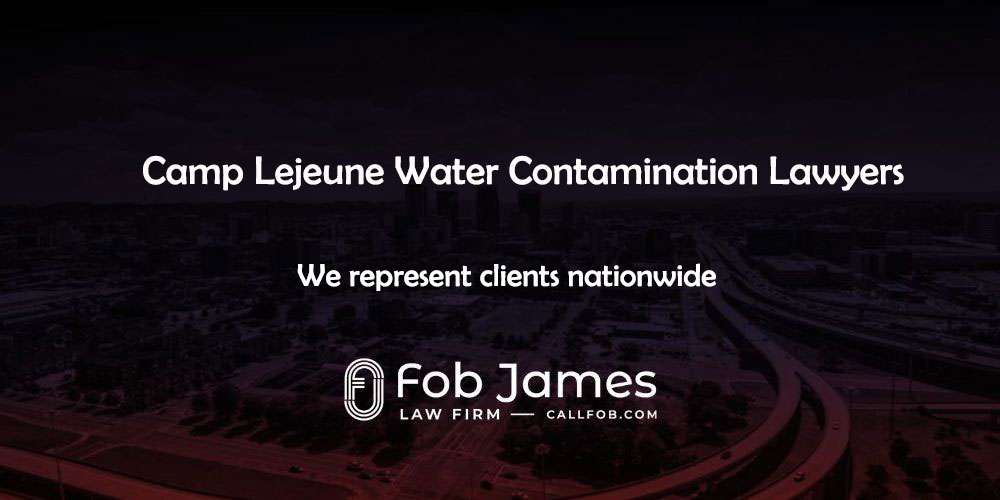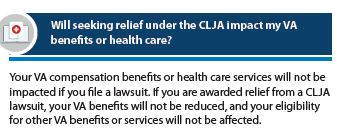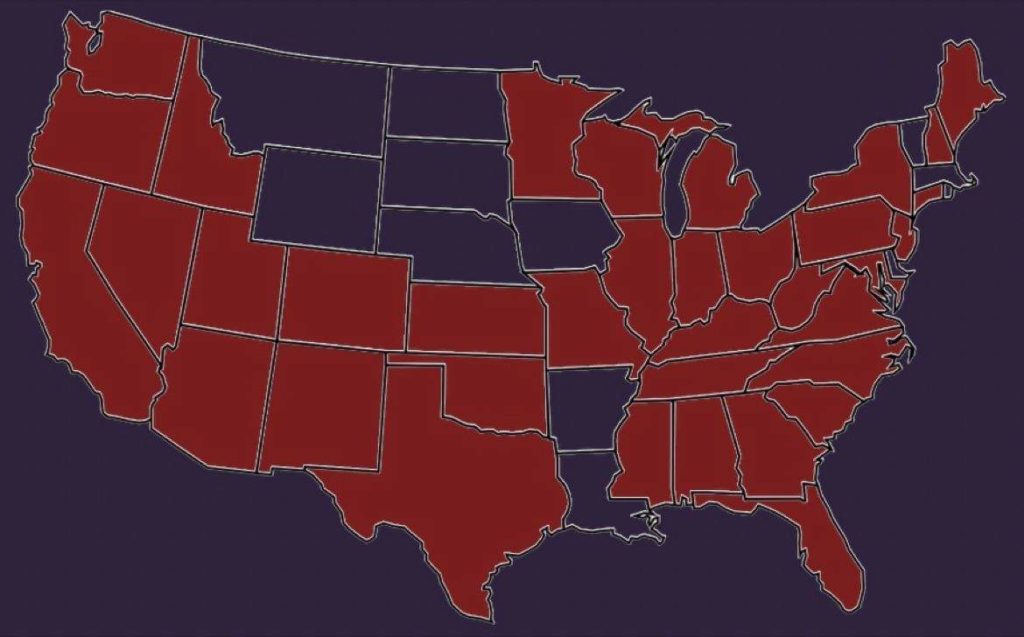
If you or a loved one were exposed to toxic water, the Birmingham Camp Lejeune Lawyers at Fob James Law Firm want to help you.
The water at Camp Lejeune from 1953 until 1987 contained toxic chemicals. Folks who lived or worked at Camp Lejeune during this time frame were exposed to harmful chemicals.
The toxic water caused serious diseases such as cancer, parkinson’s, non hodgkin lymphoma, and many others.
Please don’t hesitate to reach out to us. Our biggest concern is making sure you get the justice and the compensation that you deserve.
Contact a Camp Lejeune lawyer in Birmingham, AL today for a free case evaluation.
Camp Lejuene Water Contamination FAQ
Who Qualifies for a Camp Lejeune Water Contamination Settlement?
Contamination of water at Marine Corps Base Camp Lejeune in North Carolina and military installations near Camp Lejeune [e.g. Marine Corps Air Station New River (MCAS NR)] occurred over a span of 35 years, exposing an estimated one million people to chemicals linked with diseases like Parkinson’s disease, kidney disease, fertility problems, and several types of cancer.
Between 1953 and 1987, water treated and distributed by the Tarawa Terrace and Hadnot Point systems on Camp Lejeune Marine Base contained unsafe levels of toxic chemicals like trichloroethylene (TCE), tetrachloroethylene (also known as perchloroethylene, or PCE), vinyl chloride, and benzene.
Veterans, family members and others who lived or worked at Camp Lejeune or Marine Corps Air Station New River (MCAS NR) between August 1, 1953 and December 31, 1987 and were diagnosed with qualifying injuries may be entitled to compensation.
What Injuries Are Linked to Camp Lejeune’s Water Contamination?
The cancers and diseases that have been strongly linked to exposure to Benzene, TCE, and PCE include the following:
- Leukemia
- Bladder Cancer
- Kidney Cancer
- Liver Cancer
- Multiple Myeloma
- Non-Hodgkin’s Lymphoma
- Parksinsons
- Aplastic Anemia
- Scleroderma
- Myelodysplastic Syndromes
- Kidney disease
- Lung Cancer
- Esophageal Cancer
Other injuries linked to the contaminated water at Camp Lejeune include the following:
- ALS (Lou Gerhig’s Disease)
- Birth Defects and Injuries
- Brain Damage
- Cardiac Defect
- Fatty Liver Disease
- Hepatic Steatosis
- Infertility
- Miscarriage
- Neurobehavioral Effects
- Parkinsonian Syndrome
- Renal Toxicity
- MDS Syndrome
- Breast Cancer
- Rectal Cancer
- Brain Cancer
- Uterine Cancer
- Other Cancers
What Is the Camp Lejeune Justice Act of 2022?
On June 16, 2022, the United States Senate voted in favor of the Camp Lejeune Justice Act of 2022. This legislation opened the door for new claims on behalf of Veterans and military families injured by exposure to contaminated water at the military base. The President signed the CLJA into law on August 10, 2022.
The significance of this law is that it enlarges the time period for victims to file claims. Most toxic tort claims are barred two years after the date of discovery or after a requisite period has passed, regardless of the date of discovery. This is known as the statute of limitations and the statute of repose.
Prior to the CLJA, victims claims were barred by the statute of limitations or the statute of repose in virtually every state, including North Carolina, because the exposure occurred so long ago (1953-1987).
Thanks to the CLJA, victims of water contamination at Camp Lejeune can now file claims against the federal government.
What Can I Recover From a Birmingham Camp Lejeune Water Lawsuit?
Every case is unique, but people who file claims can potentially recover money for some of the following damages:
- Past and future medical bills (including medication, hospital stays, and in-home care)
- Pain and suffering including mental anguish
- Psychological damage
- Lost wages
- Loss of earning capacity
- The loss of enjoyment of life
- Broadly speaking, a plaintiff could be entitled to compensation for any past and future costs associated with their injury
How Long Do I Have to File a Camp Lejeune Lawsuit in Birmingham?
The Camp Lejeune Justice Act establishes a two-year time-frame from the date of the law’s enactment during which veterans, their families, and others exposed to contaminated drinking water on the military base can commence legal action.
The CLJA went into effect on August 10, 2022. Claims must be filed with the JAG by August 10, 2024. If the JAG denies a victim’s written demand, the victim has only 180 days from the receipt of the denial to file a lawsuit.
Do not delay. Contact Fob James Law Firm toll-free at 833-684-0503 for a free case analysis. Our Birmingham Camp Lejeune Water Contamination attorneys are ready to help you.
How Do I File a Camp Lejeune Water Claim Under the Camp Lejeune Justice Act?
According to the CLJA, victims must first comply with 28 U.S. Code § 2675 before filing a lawsuit. This means that victims must submit a written claim to the Office of the JAG. The JAG will have six months to either pay the claim or deny the claim.
If the JAG does not respond to the written demand within six months, then the claim is constructively denied. After a denial, the claimant has 180 days to file a lawsuit in the federal court of North Carolina.
What Do Camp Lejeune Victims In Birmingham Have To Prove?
Victims of the Camp Lejeune Water Contamination have to prove the following:
- Proof that you served or lived at Camp Lejeune for at least 30 days between August 1, 1953 and December 31, 1987;
- A current diagnosed condition; and,
- Evidence sufficient to conclude that a causal relationship exists between the diagnosis and toxic water exposure (or that a causal relationship is as least likely as not).
Fortunately, many victims will be able to meet the evidentiary burden by citing prior studies and findings by the VA and other government agencies. Also, victims can provide testimony by their treating physicians connecting the toxic water to their injuries.
Will A Camp Lejeune Lawsuit Affect My Disability From The VA?
No, your claim under the Camp Lejeune Justice Act (CLJA) is a completely separate claim. The CLJA entitles you to different damages like pain and suffering.
It is possible that some health care benefits paid for by the government (e.g. VA, Medicare) in the past in connection with the injury caused by the toxic water may offset part of your CLJA recovery.
However, the VA has made it clear that your disability benefits will not be affected by any CLJA award:

What Are The Attorney Fees To Hire A Birmingham Camp Lejeune Lawyer?
Fob James Law Firm operates on the contingency-fee-basis, which means we only get paid a percentage of the recovery if we successfully resolve your case.
Our fees come out of a favorable settlement or jury award, not out of your pocket. Importantly, if we do not obtain a recovery then you owe us nothing.
Fob James Law Firm charges every Camp Lejeune toxic water client a 20% or 25% contingency fee.
Specifically, if your Camp Lejeune claim is resolved before litigation, the attorney’s fee is 20% of the settlement. If your claim is resolved after filing a lawsuit, the attorney’s fee is 25% of the total recovery.
For an in depth analysis explaining why lawyer fees in Camp Lejeune lawsuits should be capped at 20-25%, please read our article, What Are The Attorney Fees For The Camp Lejeune Lawsuit.
What Is The Average Payout For The Camp Lejeune Lawsuit?
We believe claims will be grouped into different tiers based on the injury. For example bladder cancer cases could be one tier and parkinsons’ disease cases could be another tier.
The government will likely implement a point system based on a myriad of factors (e.g. the number of years spent at Camp Lejeune). Claims with higher points will likely be offered more money.
This is basically what the government has implemented with its “Elective Option” (EO). The EO provides settlement offers to a limited number of cases that meet very strict criteria.
Under the Elective Option, settlement amounts are based on the qualifying injury and the number of years spent at Camp Lejeune. Read our article on the Elective Option for a breakdown.
Settlement amounts will likely range from $25,000 to over $1 million dollars depending on the injury. To discuss the potential value of your case with an attorney, please contact us at 866-837-1010.
When Will The Camp Lejeune Lawsuit Be Settled?
No one knows when the Camp Lejeune lawsuits will settle. The filed lawsuits have been consolidated for the purpose of efficiency. The litigation is underway for tracks 1, 2, and 3.
The Federal Judges presiding over the litigation will schedule “bellwether” trials (test trials), likley beginning in 2025. These trials will hopefully apply pressure on the government to start reviewing and settling cases.
For cases that meet the criteria under the Elective Option, the government will make offers on its own time. The government first determines that a case qualifies under the EO before making an offer. Only a small percetange of cases actually qualify under the government’s narrow criteria.
This is completely speculative but for most cases we believe the time frame for settlement could be 2 years.
The Risk of Cancer and Parkinson’s Is Real
In 2014, Frank J. Bove with the Centers for Disease Control and Prevention and several colleagues published a mortality study (the “Bove Study”) of civilian employees at Camp Lejeune exposed to water contaminated with solvents.
The study concluded that elevated toxins in the water system at Camp Lejeune increased the risk of cancers of the kidney, liver, esophagus, cervix, multiple myeloma, Hodgkin lymphoma and ALS.
Furthermore, the federal government’s Agency for Toxic Substances and Disease Registry (ATSDR) conducted an extensive mortality study of military personnel at Camp Lejeune compared to personnel at Camp Pendleton.
Over the same time period, the Camp Lejeune group had higher mortality rates for the following causes of death:
- Cancers of the cervix, esophagus, kidney, liver, lung, pancreas, prostate, rectum, and soft tissue
- Hodgkin’s lymphoma
- Leukemias
- Multiple myeloma
- Multiple sclerosis
Moreover, a recent study conducted by JAMA Neurology concluded that marines exposed to the toxic water at Camp Lejeune had a 70% greater risk of developing Parkinson’s disease.
Camp Lejeune Lawsuit Updates
For the latest news on the Camp Lejeune lawsuit, visit our blog. We update the litigation blog every week or month to give you the most recent information available.
May 28, 2024 – General Update on the Camp Lejeune Litigation
If you are looking for a general overview (as of May 2024) of what’s been happening the Camp Lejeune litigation, below is a good starting point:
Track 1 Bellwether Trials.
As previously mentioned, there are 100 Track 1 “test” cases being prepared for trial. Track 1 cases consist of the following conditions:
- Bladder Cancer,
- Kidney Cancer,
- Non-Hodgkin’s Lymphoma,
- Leukemia, and
- Parkinson’s Disease.
Right now, that is the primary focus of this litigation, since the outcome of these test trials will influence the ultimate amount of the settlements and therefore impact all claimants in the Camp Lejeune litigation.
The “fact discovery” process for these 100 cases ends next month (e.g., depositions of plaintiffs and plaintiffs’ treating physicians, answers to parties’ written questions, etc.). After that, we will shift to the expert component of the 100 Track 1 Bellwether cases and then trial.
Our hope is that these first 100 trials will take place either later this year or in the first part of 2025, but we do not have trial dates yet.
Track 2 Bellwether Cases
As a reminder, Track 2 cases consist of the following conditions:
- Kidney disease,
- Breast cancer,
- Liver cancer,
- Prostate cancer, and
- Lung cancer.
The selection process for Track 2 bellwether cases is underway. Similar to Track 1, 100 test cases for Track 2 will be selected.
Track 3 Cases and Beyond
These tracks will be comprised of other injuries not included in Tracks 1 and 2. These injuries have not yet been decided by the Court.
Keep in mind that the “track” does not have anything to do with the value or merit of a case. The Court is simply trying to litigate the categories of injuries/diseases with the most possible claimants first, in order to reduce the overall number of claimants in the litigation.
Also, it’s possible that settlement offers will be made prior to Tracks 2 or 3 even making it to trial. Time will tell how this ultimately plays out, but we are hopeful that the Track 1 Bellwether trials will have a positive impact on the litigation and increase the prospects of an early global settlement.
Jury Trials
Earlier this year the EDNC Federal Court struck plaintiffs’ demand for jury trials. The plaintiff leadership group attempted to immediately appeal the Court’s decision, but the Court ruled that any appeal must wait until after the first round of bench trials take place.
Note, a “bench trial” is simply when the judge makes the decisions rather than a jury. Although we would prefer to have jury trials in this litigation (because jury trials typically result in larger verdicts than bench trials), bench trials do provide some advantages in this type of litigation, particularly in terms of predictability on the amount of damages awarded at trial.
For example, if a judge rules that a certain category of injuries (e.g., Kidney Cancer or Parkinson’s) are worth between $2 and 5 million dollars at trial, that will be a good indicator of what those cases would be worth if the same type of case goes to trial before that particular judge.
Every case is obviously unique/different, but bench trials are still far more predicable than if 12 strangers off the street were to rule on the case (e.g., one jury could award $20 million dollars on a case and a different jury could award $0 on the same case). If the bench verdicts seem unreasonably low or unfair, we have no doubt that the bench verdicts will be appealed.
Other Issues
Lastly, there are numerous motions pending before the Court that are waiting to be ruled on. Among other things, these pending motions include:
- plaintiffs’ motion for partial summary judgment on specific causation,
- plaintiffs’ motion to expedite track one trials,
- and plaintiffs’ motion for reconsideration denying motion to compel muster rolls and ATSDR study.
Once these motions are ruled on by the EDNC federal court judges, we will post updates here.
Related: Read Our Camp Lejeune Lawsuit Blog for More Updates
We Represent Camp Lejeune Toxic Water Clients Nationwide
Fob James Law Firm is honored to represent veterans and their families who have suffered injuries caused by contaminated water at Camp Lejeune. We are currently representing clients in 48 states:

Irrespective of where clients are located, Camp Lejeune lawsuits must be filed and litigated in federal court in North Carolina. We are ready to aggressively represent you and your family on your claim no matter what state you reside in.
Contact a Camp Lejeune Lawyer Near Me In Birmingham, AL
At Fob James Law Firm, our job is to fight for your best interests. If you’ve suffered an injury as a result of exposure to contaminated water at Camp Lejeune, you should contact us immediately.
We can determine if you are eligible to file a claim or not. It won’t cost you anything to speak with us.
Additionally, you’ll never pay us anything until we successfully settle or win your case in court. Our Camp Lejeune attorneys in Birmingham are experienced, dedicated, and they truly care about you.
We treat all of our clients exactly how we would want our own family members to be treated. Contact us right now at 205-407-6009 or set up a free case evaluation so we can help you.